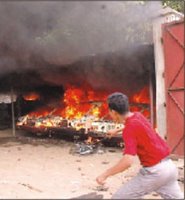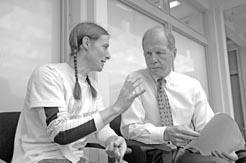September 23, 2011
By STEVEN GREENHOUSE
The Dallas Cowboys have a new merchandising arm that recently jumped into the business of producing college-logo apparel for leading universities, but the Cowboys subsidiary has already encountered a stubborn opponent — student groups that contend it is using overseas sweatshops.
At Ohio State, many students and professors are pressing the university’s administration not to sign a proposed multimillion-dollar deal with the Cowboys’ affiliate, Silver Star Merchandising. And at the University of Southern California, students returning to campus this fall are voicing outrage that their school signed an ambitious 10-year licensing deal with the Cowboys last May while keeping the negotiations secret from the students.
Natalie Yoon, president of the United Students Against Sweatshops chapter at Ohio State, said: “This proposed licensing deal is very problematic given the Dallas Cowboys’ labor history. Just skimming the surface, we found the Cowboys produced merchandise at four factories that have egregious sweatshop violations.”
That anti-sweatshop group, with more than 150 college chapters nationwide, said Silver Star Merchandising had used one factory in El Salvador that, according to monitoring groups, threatened union supporters, had drinking water that was contaminated and illegally forced employees to work huge amounts of overtime. The group cited a second El Salvador plant that factory monitors said had spied on union supporters and put them in worse jobs at lower pay.
United Students Against Sweatshops also said that Silver Star had manufacturing done at an Indonesian factory that suddenly closed, its owners fleeing, without paying $3 million in legally required severance pay owed to its 2,800 employees.
The Cowboys’ Silver Star Merchandising subsidiary acknowledges that it, like many other American apparel companies, has used some factories that had problems, but it said it was trying to improve conditions at those facilities.
“We are very serious about our social compliance responsibilities,” said Bill Priakos, Silver Star’s chief operating officer. “We have a very aggressive code of conduct for all factories representing our brand.”
In 1996, the Cowboys became the first football team to insist on handling its merchandise rights in-house. Jerry Jones, the team’s owner, sought to extend the team’s retail expertise last year by founding Silver Star, which says it is seeking to produce and distribute college-logo apparel for a limited number of prominent universities, starting with U.S.C. and Ohio State. His son Jerry Jones Jr. is Silver Star’s president.
The anti-sweatshop groups have tussled in recent years with Nike, Gap, Russell Athletic and other companies, pushing them to improve poor conditions at some of the factories they use. Now these groups have made Silver Star their newest target, arguing that it, as the new kid on the block, has not done its human rights homework and has an especially bad track record in using factories with violations.
Rick Van Brimmer, Ohio State’s director of trademark and licensing services, said his university would not consider a licensing deal with a company that did not take workers’ rights and codes of conduct seriously.
“Whether we are talking about prospective licensees or existing licensees,” he said, “we are committed to an aggressive and meaningful corporate social responsibility program.” He said this meant engaging with “companies that share those goals” and were willing to work on corrective measures.
Both Silver Star and Mr. Van Brimmer said their philosophy was not to walk away from a bad factory, but to press the factory to make needed changes.
Julia Wang, a U.S.C. sophomore who is a co-president of the school’s Student Coalition Against Labor Exploitation, said students were angry that they learned of their school’s Cowboys deal only through news reports.
“We asked how they managed to sign a deal with the Cowboys without any student input when there are all these widely known cases of sweatshop abuse in some of the factories they use,” Ms. Wang said. “We asked, ‘What are you going to do about it?’ and again and again all we’ve gotten are wishy-washy answers. We’re looking for improved policies and action.”
U.S.C. officials defended Silver Star, maintaining that it, like the school’s other apparel licensees, was intent on working with universities and factory owners to ensure that the factories complied with codes of conduct. U.S.C. officials declined to discuss the scope or value of the contract, although they said total sales of U.S.C.-themed merchandise exceeded $20 million a year.
Matthew Curran, U.S.C.’s director of trademark, licensing and social responsibility, said the school required all licensees to comply with a strict code of conduct that barred factories from violating labor laws and having abusive conditions. Mr. Curran said that his university’s agreement with the Cowboys would enable U.S.C. to consolidate more of its marketing and distribution with a small group of companies.
“We believe this will give us and other parties involved an enhanced ability to track, monitor and to ideally have greater influence on those factories,” he said.
When the PT Kizone factory in Indonesia closed without paying $3 million in severance, Nike, one of the factory’s major customers, said it and one of its middlemen would put up $1.5 million toward severance. Teresa Cheng, international campaigns coordinator with United Students Against Sweatshops, complained that Silver Star had been very reluctant to help pay for severance.
“We went to the Cowboys and asked them to tell us the name of one factory they used that complied with Ohio State’s code of conduct, and they couldn’t name a single factory,” Ms. Cheng said.
Mr. Curran of U.S.C. defended Silver Star, saying it stopped doing business with PT Kizone before the factory closed — an assertion the student group contests. Mr. Curran said Silver Star was not contractually or legally responsible to help pay severance, but it “has been in contact” with “other stakeholders in an effort to find a resolution.”
As for the two El Salvador factories, Mr. Priakos of Silver Star said his company represented less than 5 percent of their production. He said a monitoring group was working with the factories to ensure that the factories came into compliance with the law and codes of conduct.
Ms. Yoon, mentioning a November 2010 e-mail by Mr. Van Brimmer, Ohio State’s licensing director, said the university had an unfair, telescoped selection process that unduly favored Silver Star. In that e-mail, Mr. Van Brimmer told Silver Star: “I may be forced into looking at ‘bids’ simply because we are a state agency. But don’t fear that process.”
Mr. Van Brimmer said the process was transparent, thorough, competitive and fair, adding, “No one was promised anything, and to classify it as a ‘charade’ is blatantly untrue, unfair and disrespectful,” to all those involved in the process.
http://www.nytimes.com/2011/09/24/business/students-object-to-use-of-sweatshop-labor-on-college-clothing.html?pagewanted=all


